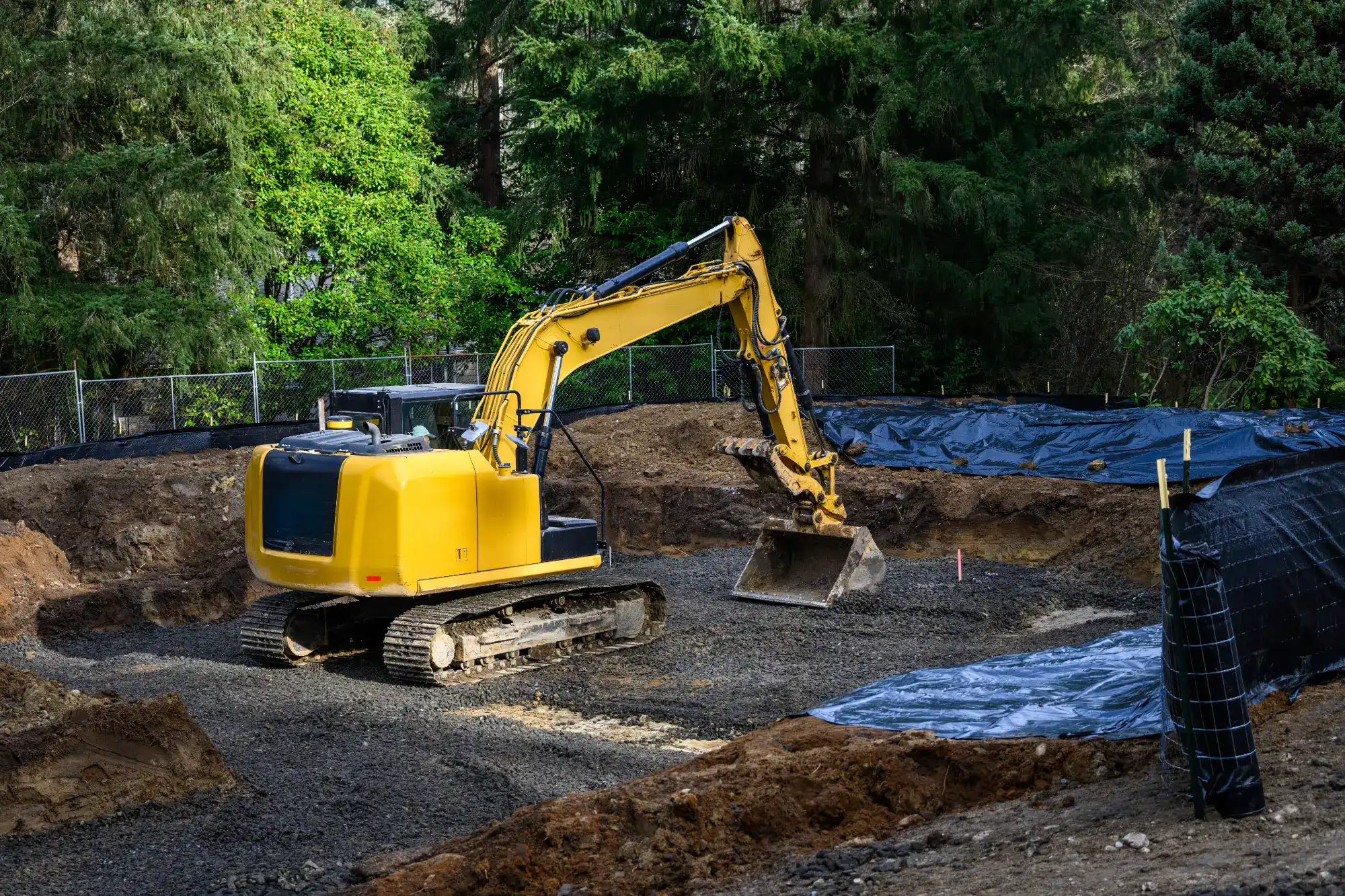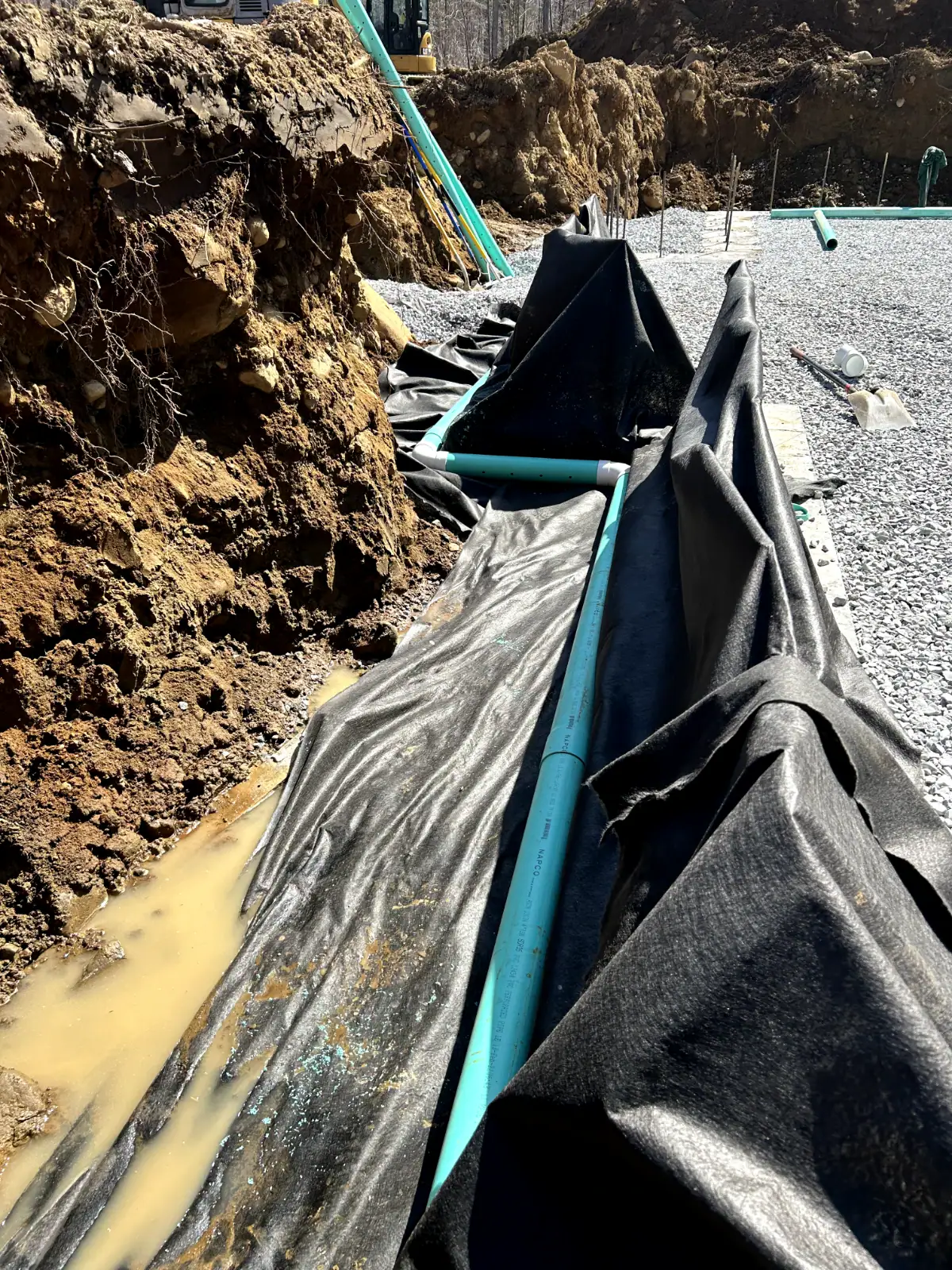Excavation projects face predictable challenges—from unexpected soil conditions to drainage issues. Here's how experienced contractors handle them.
Share:

Summary:
Your project plans might show level ground, but what’s beneath the surface tells a different story. Soil conditions can change dramatically within just a few feet, turning what looked like straightforward excavation into something much more complex. Sandy soil might not provide the stability you need for your foundation, while clay-heavy ground can create drainage nightmares.
Rock formations present their own set of problems. What appears to be soft earth on the surface might hide bedrock just a few feet down, requiring specialized equipment and techniques to break through safely and efficiently.

We start every project with thorough soil testing and site assessment. This isn’t just paperwork—it’s your insurance policy against costly surprises. We conduct geotechnical reports before breaking ground, giving us a clear picture of what we’re working with below the surface.
When we encounter unexpected conditions, we have the equipment and expertise to adapt quickly. Soft or sandy soil gets stabilized using proven techniques like compaction or soil reinforcement. Rocky terrain requires specialized heavy equipment like hydraulic breakers and rock saws that can efficiently cut through even the hardest surfaces without damaging surrounding areas.
The key difference between amateur and professional work shows up in how we prepare for these scenarios. We conduct thorough site mapping to identify potential trouble spots before we start digging. This proactive approach means we arrive with the right tools and techniques already planned out, reducing equipment strain and minimizing downtime that costs you money.
The best way to avoid soil-related problems is working with contractors who invest time in proper site evaluation upfront. This means hiring teams that don’t rush through the planning phase and actually take the time to understand your specific site conditions.
We know that different soil types behave differently depending on moisture content and composition. Some soils cave back into holes and trenches, while others become nearly impossible to move when conditions change. We account for these variables in our project planning and timeline estimates.
Weather plays a huge role in how soil behaves during excavation. Upstate New York’s climate means we need to understand how seasonal changes affect soil stability and plan accordingly. We know when to pause work during heavy rain or wet conditions and when it’s safe to continue, protecting both the project timeline and the integrity of the excavation work.
Want live answers?
Connect with a Emerson Excavating and Trucking expert for fast, friendly support.
Water is excavation’s biggest enemy, and Saratoga County’s climate makes water management a critical part of every project. High water tables, seasonal flooding, and poor surface drainage can turn a straightforward excavation into a muddy mess that brings work to a complete halt.
Surface water creates immediate problems when it flows into excavated areas. Underground water presents longer-term challenges that require specialized equipment and techniques to manage effectively. Both scenarios can cause significant delays and cost overruns if not handled properly.

We measure groundwater levels during the planning phase, long before we start digging. If the water table is high, we employ dewatering methods like pumps and drainage systems to keep work areas dry and functional throughout the project.
For ongoing water infiltration problems, we install perimeter drains that divert water away from the excavation site. These aren’t temporary fixes—they’re engineered solutions that keep your construction site functional and safe no matter how much water is lurking underground.
Surface water management requires a different approach but equal attention to detail. We provide proper surface drainage solutions like ditches and temporary channels to divert surface runoff away from excavated areas. Without these measures, your excavation can suddenly fill with water during the next heavy rain, causing construction delays and potentially dangerous working conditions.
We also understand the importance of monitoring water flow throughout the project. We accurately record the quantity of water being removed from excavated areas to track any increases that might signal bigger problems developing underground.
Upstate New York’s cold winters create unique water management challenges that inexperienced contractors often underestimate. Freezing and thawing cycles cause soil shifting that can damage sewer and water lines, leading to costly repairs if not addressed properly during excavation.
Snow management becomes crucial during winter projects. We install snow fences around excavation areas at strategic locations to protect work sites from drifting snow that can fill trenches and create safety hazards.
Spring thaw presents its own set of problems as frozen ground releases accumulated moisture all at once. We plan for these seasonal variations and adjust our water management strategies accordingly. We maintain surface drainage systems throughout the entire project timeline, not just during active excavation work, keeping sites in good condition until backfilling is complete.
The difference between amateur and professional water management shows up most clearly during unexpected weather events. We have contingency plans in place for heavy rain, rapid snow melt, and other weather-related challenges that can impact excavation work.
The challenges facing excavation projects in Saratoga County are predictable, but overcoming them requires experience, proper equipment, and detailed planning. We’ve seen these problems before and developed proven systems for handling them efficiently.
When you’re evaluating contractors for your project, look for teams that emphasize thorough site assessment, comprehensive planning, and proactive problem-solving. The right contractor will walk you through potential challenges specific to your site and explain exactly how they plan to address them.
Choose excavating contractors who invest in proper equipment and maintain it regularly, because equipment failures during critical phases of excavation can bring your entire project to a halt. Working with Emerson Excavating and Trucking means partnering with professionals who understand Saratoga County’s unique excavation challenges and have the experience to handle them efficiently.
Article details:
Share:
Ready to Start Your Project Right?
Get a straightforward quote for your excavation, aggregate, or dumpster rental needs. No pressure, just honest answers and reliable service from local professionals who understand your area.
Emerson Excavating and Trucking
Company
Support
Useful Links